Glorious Olajire
Africa’s developer community is experiencing exponential growth due to the continent’s young and vibrant population, which is increasingly leveraging technology to solve problems, develop businesses and bring growth to Africa.
The rise in tech training opportunities is also leading to a growing number of developers. As Africa gradually becomes the go-to destination for top talent, this presents a valuable opportunity to strengthen the support system for success in the tech industry. We need a sustainable system that goes beyond just providing training and job opportunities.
This increasing demand for tech talent, has additionally led Africa to take proactive steps by establishing tech communities to meet this need. These local hubs now provide training, mentorship, and host conferences, as well as residential and non-residential boot camps to meet the growing demand in technology markets.
These communities have not only focused on learning but also play a pivotal role in guiding members through their transition to technology. They offer valuable support in building professional networks, refining job applications, excelling in the professional sphere, participating in hackathons, and providing assistance to alleviate frustrations. One of such communities working to close the gap is Product Hub Africa [PHA].

This community was created based on the founder’s experiences as a budding product manager who struggled to find a support system, mentorship, and a place for learning while navigating the tech industry. After considerable thought, Victoria Oladosu established Product Hub Africa with a group chat of 50 people, consisting of supportive members ready to answer questions for those who are new to the tech world.
PHA is a community founded to empower Africans globaly in tech. The vision of Product Hub Africa “is to create a world where Africans are recognized and equally represented in the technology space”. From the community’s name, it could be assumed that Product Hub Africa is just about product tech, but, Oladosu says “Product of Africa is for everybody in tech, as far as you are working on a product, plan to work on products, own products or you’re developing a product.”
Since 2022, the community has prioritized SDG 4 (Quality Education) to create a new generation of talented and recognized Africans. For PHA, the product in the name is a starting point and an outlook alteration tool for community members.

Victoria Oladosu is in the middle wearing a customized white t-shirt.
Victoria Oladosu transitioned to tech in 2019, having studied Economics at the University of Ilorin, Kwara state, Nigeria. She gathers creativity from travelling and learning. “I love to explore and travel, and whenever I travel, I love to learn. I love to learn about traditions and that also builds my inspiration.” Her leadership training is also unique, as she added, “I have never taken a leadership course. I have never watched a leadership tutorial on YouTube. So I just feel that it comes naturally, and I really thank God for that.” She also had some leadership experience from the Women Techstars fellowship, where she led more than 100 women in tech. ”Still today, they never forget. They always circle back. I created a group for them, and we use that to share job opportunities and motivating words”
PHA is a community that also offers opportunities for growth in tech, with mentorship sessions, free training, and boot camps. Apart from these, Product Hub Africa also has an initiative called stem-in-school. It started in Lagos, for secondary school students in senior secondary school two (SSS 2) and senior secondary school three (SSS 3).

Stem-a-school in Nasarrawa, 2023
The schedule works around their school work, to avoid affecting their senior secondary school exams. The choice of secondary schools for the initiative is always dependent on proximity and access. “Proximity because I don’t do it alone. We are a team at Product Hub Africa. We are able fortify our team members and make them realize some of their potential. It also has to be a low-cost school, meaning either it’s a government school; what we call the public school or a missionary school”, Oladosu explained. She also expanded on the support provided to these students “While we train them, we also give them resources and make sure we follow up with them with opportunities and advanced training”

Stem-a-school in Nasarrawa, 2023
During the last STEM-a-school outreach, despite receiving unfavorable responses from some proposed sponsors, the team was still able to gather learning materials and gifts for the students.
Still on the stem-a-school initiative, Aishat Dosunmu, a programs manager, shared that at the last project, the team got a sponsorship from DUDU, and that, “All students got stem books, writing pads and pens and school bags, while the hackathon winners also got a certificate and an award in addition to their general gifts” The average timeline for the training for these students are from three weeks to one month.
The team’s small size, consisting of a core team of four and a volunteer team of six, does not hinder their ability to achieve significant results. This is attributed to their ability to plan adequately.
Another PHA programs manager; Adegboye Opeyemi, also added that in 2023, the average size of the boot camp was 200 students. For boot camp 2.0, the community offered the following courses under their learning track: product management, technical writing, cyber security, product design and developer relations. In boot camp 2.1, which started in March 2024, the data analytics course was substituted for developer relations, to further serve the need for adequate training.
A beneficiary of boot camp 2.0, Mutiat Adepoju, who took the technical writing track in 2023, shared that, before she joined the boot camp,” I didn’t know how to style guides. I have heard about it but I didn’t know how to go about it. Our coach during PHA boot camp explained very well and now I know how to use it while writing. He also explained other parts of technical writing very well.”
Effectively managing thousands of people across multiple social media platforms presents its challenges. Engaging with members on platforms such as WhatsApp, Instagram, Slack, LinkedIn, and X (formerly Twitter) requires careful planning and execution. Despite these challenges, the team has been able to balance community engagement with other activities such as training, mentorship sessions, and hiring support, while building trust and fostering a positive tech journey for their members. The community stays connected by participating in various activities on specific days such as Monday motivations and Wednesday wins.
In 2024, the community aims to expand its membership from 5000 and empower various people. Additionally, they plan to host a Product conference in Nigeria.
Photo Credit: Product Hub Africa




